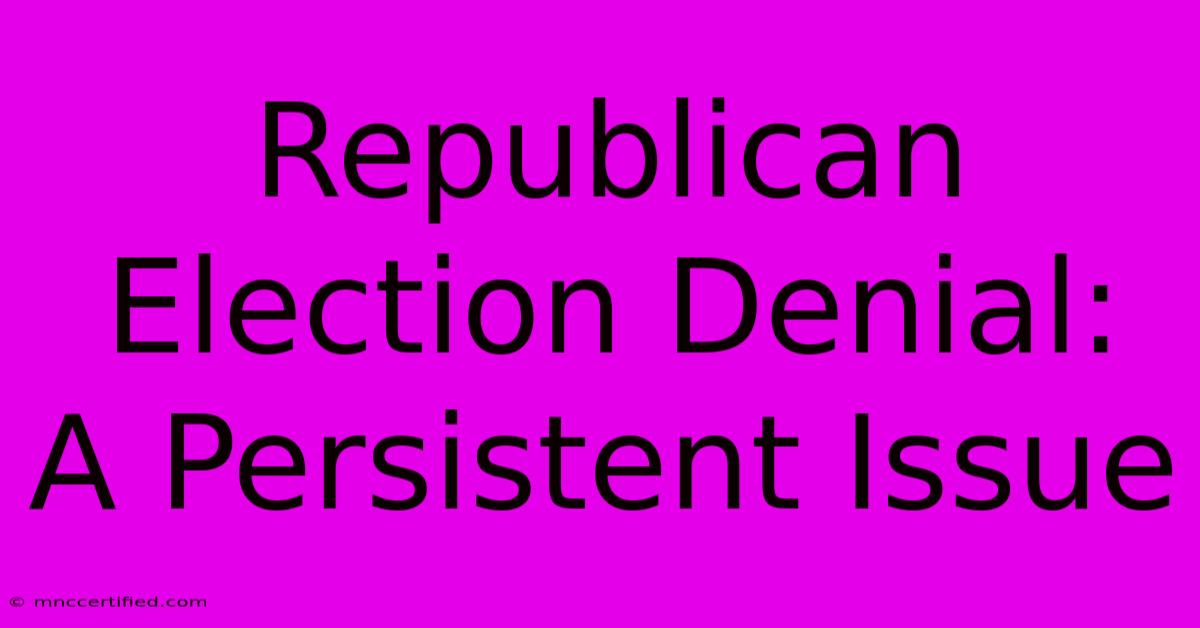Republican Election Denial: A Persistent Issue

Table of Contents
Republican Election Denial: A Persistent Issue
The 2020 presidential election was a pivotal moment in American history. While Joe Biden was declared the winner, many Republican voters and elected officials refused to accept the results, perpetuating the notion of widespread election fraud. This election denial has become a defining feature of modern Republican politics, impacting everything from campaign strategies to the future of American democracy.
The Roots of Election Denial
The roots of Republican election denial can be traced back to the rise of Donald Trump. His frequent claims of a "rigged system" and his attacks on the legitimacy of the election process, even before the 2016 election, laid the groundwork for a culture of distrust. Trump's repeated assertions of voter fraud, often without evidence, fueled suspicion and paved the way for a broader acceptance of conspiracy theories.
This distrust was further amplified by partisan media outlets, which echoed and amplified Trump's claims. Conservative news channels like Fox News and websites like Breitbart News played a significant role in disseminating misinformation and promoting the idea of a stolen election.
The Impact of Election Denial
The consequences of this pervasive denial have been far-reaching.
- Erosion of Trust: The repeated claims of election fraud have eroded trust in the American electoral system, creating a sense of cynicism and disillusionment among voters. This distrust can lead to apathy and disengagement, undermining the very foundation of democracy.
- Political Polarization: Election denial has deepened the political divide in the United States, contributing to the growing partisan polarization that characterizes the nation. This polarization makes it increasingly difficult to find common ground and address important issues.
- Legitimacy of Elections: The continued questioning of election results has raised serious concerns about the legitimacy of future elections. If voters lose faith in the process, it can lead to instability and unrest.
- Violence and Intimidation: The rhetoric of election denial has contributed to a climate of fear and intimidation, culminating in the January 6th attack on the U.S. Capitol. The attack was a direct result of the belief that the election had been stolen, fueled by months of misinformation and false claims.
Moving Forward
Addressing the issue of Republican election denial requires a multifaceted approach.
- Countering Misinformation: It's crucial to actively combat misinformation and provide accurate information about the electoral process. This includes supporting fact-checking organizations and promoting media literacy.
- Restoring Trust: Building trust in the electoral system requires transparency and accountability. This includes ensuring secure and fair elections, strengthening election infrastructure, and addressing voter concerns.
- Political Reform: Reforming the political system to reduce the influence of special interests and increase voter participation can help address some of the underlying factors that contribute to election denial.
- Civil Discourse: Encouraging civil discourse and promoting respectful dialogue across political divides can help bridge the gap and foster a more unified society.
Republican election denial is a complex issue with deep roots in the American political landscape. While the consequences are serious, addressing the issue requires a concerted effort from all stakeholders, including politicians, media outlets, and citizens. Only by tackling misinformation, rebuilding trust, and promoting a more inclusive political system can we hope to restore confidence in our democracy and ensure a future where elections are fair and their results are accepted by all.

Thank you for visiting our website wich cover about Republican Election Denial: A Persistent Issue . We hope the information provided has been useful to you. Feel free to contact us if you have any questions or need further assistance. See you next time and dont miss to bookmark.
Featured Posts
-
Live Cricket West Indies Vs England 3rd Odi
Nov 07, 2024
-
Discover Shetland Open For Exploration
Nov 07, 2024
-
Rice Community Turns Out For Election Day
Nov 07, 2024
-
Fc Barcelona Vs Red Star Belgrade Live Stream Guide 11 6 24
Nov 07, 2024
-
Do Credit Unions Offer Free Life Insurance
Nov 07, 2024